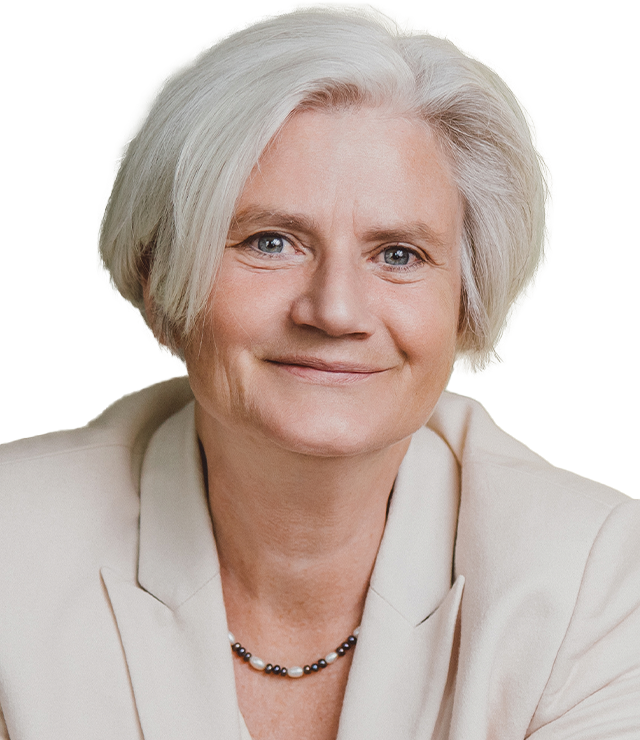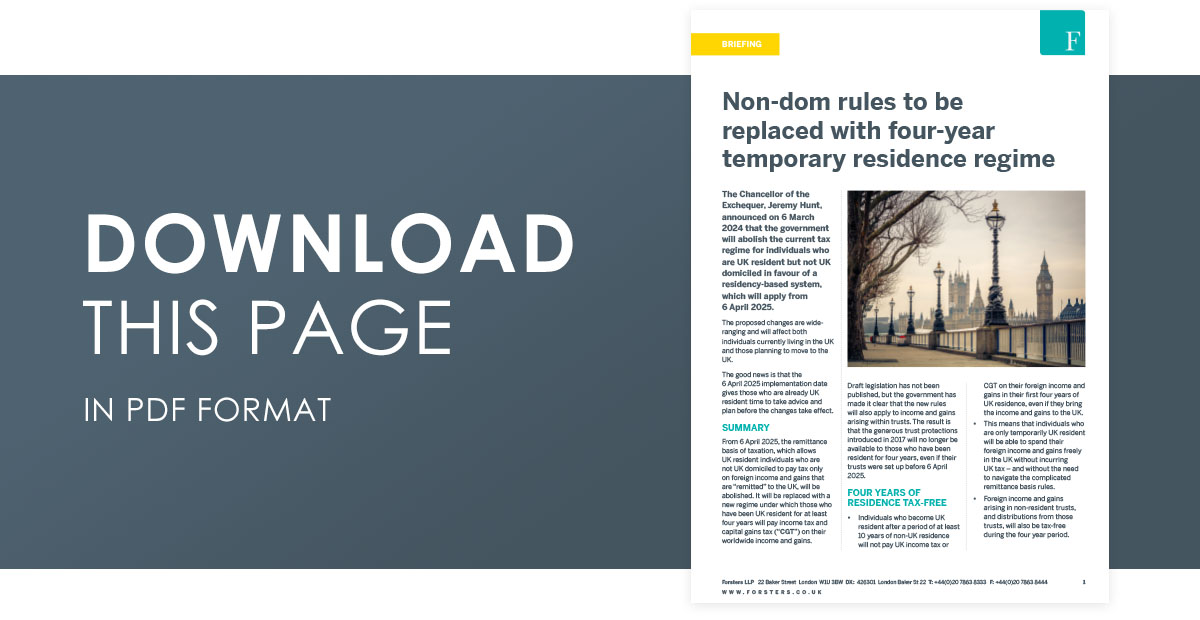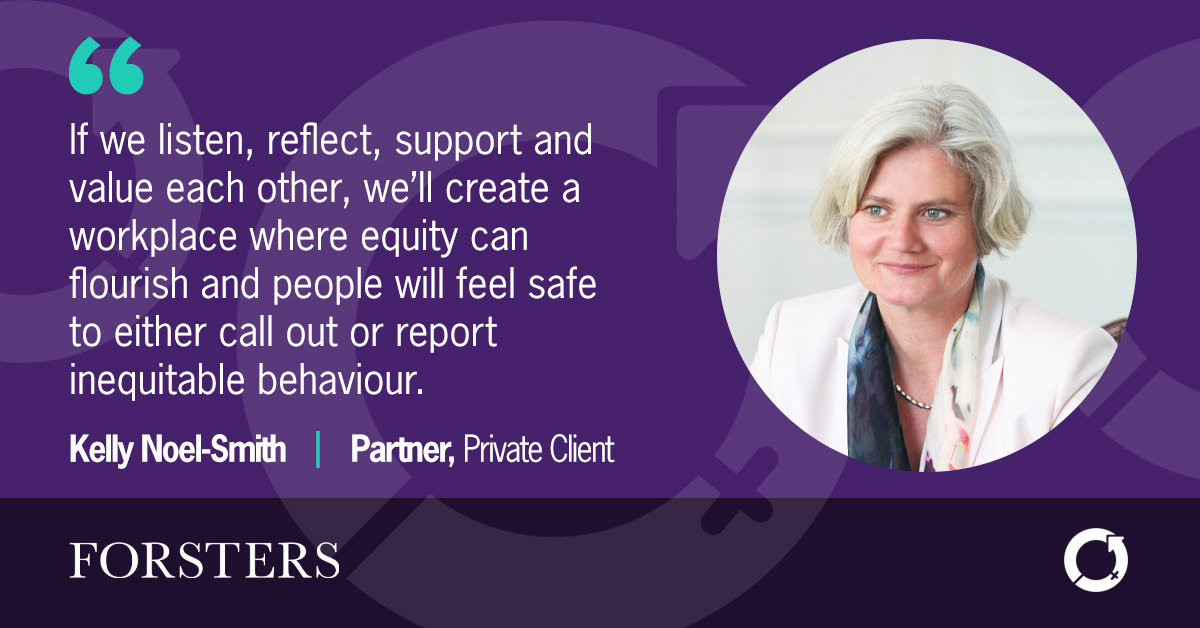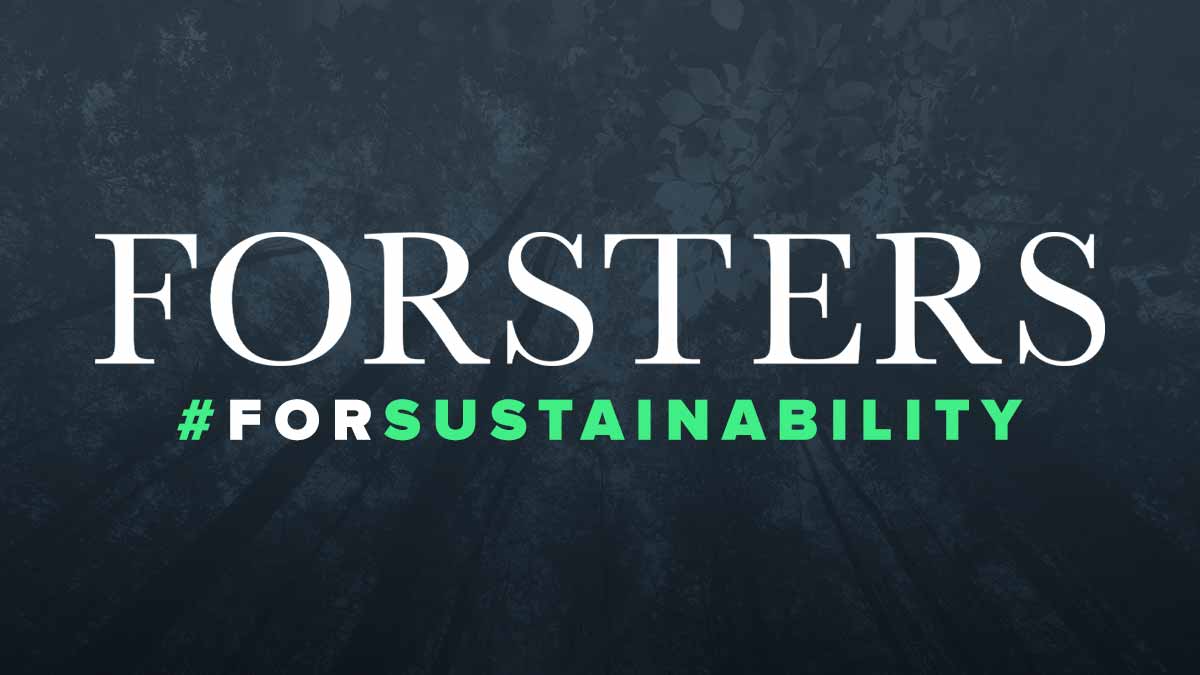Labour presses ahead with non-dom abolition

In her first budget held on 30 October, the new Chancellor, Rachel Reeves, confirmed that the government will press ahead with the abolition of the non-dom tax regime.
Draft legislation has been published setting out the detail of the new rules, which will apply from 6 April 2025.
The proposals are broadly in line with those announced by the previous government in March. The information released yesterday brings some clarifications, and significant further detail in relation to the reforms to inheritance tax (IHT).
Income and gains – the FIG regime
A new four-year foreign income and gains (FIG) regime will apply from 6 April 2025. Those who qualify for the FIG regime will benefit from a complete exemption from UK tax on their foreign income and gains, whether or not they remit them to the UK. Anyone wishing to avail themselves of the regime will need to declare their global earnings on a tax return that will need to be submitted to the UK tax authority (HMRC).
Eligibility for the new regime
The four-year FIG regime will be available to anyone in their first four years of UK residence, provided they have not been UK resident in the previous 10 years.
This means that those who are already UK resident will only be eligible for the new regime if they became UK resident on or after 6 April 2022 and were non-UK resident in the preceding 10 tax years. Subject to the residence criteria, the four-year FIG regime will be available to UK citizens and UK domiciliaries.
Trusts
The FIG regime will apply to non-UK resident trusts. Settlors who are within the FIG regime will not be taxed on the foreign income and gains of trusts they have created. Beneficiaries will not be taxed on distributions that are matched with income and gains of the trust while they are eligible for the regime.
Exceptions
Those individuals who are not in the FIG regime will be subject to income tax and capital gains tax (CGT) on their worldwide income and gains. Settlors will generally be taxed on the worldwide income and gains of trusts from which they can benefit. Currently, there are exceptions from the automatic attribution of income and gains for those who have funded overseas companies (including companies owned by non-resident trusts) where the avoidance of UK tax was not a reason for creating the structure. These exceptions – the so-called “motive defences” – will continue to apply although the rules of which the motive defences form part will be subject to government review in the course of 2025.
Transitional rules
There are two transitional rules for individuals who were already UK resident:
-
Temporary Repatriation Facility
The Temporary Repatriation Facility (TRF) will allow those who have previously been taxed on the remittance basis and who have unremitted income and gains to remit them and pay tax at a reduced rate. The TRF will be available for three years from 6 April 2025 (i.e., until 5 April 2028).
The reduced rates will be as follows:
-
- 12% in the 2025/2026 and 2026/2027 tax years; and
- 15% in the 2027/2028 tax year
The TRF will also apply to unremitted income and gains arising in non-UK resident trusts and non-UK resident companies before 6 April 2025, and also income and gains arising within such a structure that has been attributed to them before this date under the UK’s anti-avoidance rules. In addition, the TRF will cover pre-6 April 2025 income and gains within such structures that have not been attributed to the individual to the extent that the income and gains “matches” to benefits received by the individual during the TRF window. However, the TRF will not be available for distributions of post-6 April 2025 income.
-
Capital gains tax rebasing
This will allow current and past remittance basis users to rebase foreign assets to their market value as at 6 April 2017. This could reduce the chargeable gain if an asset is disposed of on or after 6 April 2025 and the individual is not eligible for the FIG regime.
This CGT rebasing will not be available to individuals who are already UK domiciled or deemed UK domiciled, or become so prior to 6 April 2025.
Inheritance tax
From 6 April 2025, a person will be within the scope of IHT once they have become a ‘long-term resident’ of the UK. Domicile will cease to be relevant. An individual will become liable to IHT on their worldwide assets once they have been UK resident for at least 10 out of the immediately preceding 20 tax years. This will be determined based on the existing residence rules – the statutory residence test (SRT) from the 2013/2014 tax year onwards; and the pre-SRT rules for earlier years.
UK situated assets and non-UK situated assets that derive their value from UK residential property will remain within the scope of IHT, regardless of other factors.
The “tail period”
It had previously been proposed that, once within the scope of worldwide IHT, an individual would remain so for 10 years after ceasing UK residence. That will be the case for an individual who has been UK resident for at least 20 years, but the “tail” period will be reduced where the individual has been UK resident for between 10 and 19 years, on a taper basis. For example, an individual who has been UK resident for 13 out of 20 tax years, will only need three years of non-UK residence to fall outside the scope of IHT.
“Excluded property” trusts
Buried in the budget announcements, there was some limited good news for non-doms with existing “excluded property” trusts. Currently, non-doms who settled non-UK assets into trust are protected from IHT on death. The government had announced previously that this protection would be lost. In response to widespread lobbying, the government has decided that excluded property trusts settled before 30 October 2024 should continue to be exempt from IHT on the death of the settlor.
Non-UK situated property held within a discretionary trust will no longer be excluded property where, and for so long as, the settlor is a long-term resident within the scope of IHT. If the settlor loses their long-term residence status, then the trust can reacquire excluded property status and this will trigger an exit charge for IHT. Settlements that currently have a UK domiciled settlor (under current rules) who will not be a long-term resident (under the new rules) on 6 April 2025, will be facing an unexpected exit charge. Many trusts will be in a situation where the settlor is non-domiciled (under current rules) but will be a long-term resident (under the new rules) and will become subject to the ongoing IHT charging regime with periodic and exit charges.
Commentary
The government has placed growth and wealth creation at the centre of its agenda. It has promoted the FIG regime as “internationally competitive”. The assumption seems to be that those who move to the UK to take advantage of the regime will remain beyond the four-year period and accept UK tax on their worldwide assets thereafter.
The appeal of what is (in effect) a four-year tax haven has drawn speculation. The obligation on those availing themselves of the FIG regime to report their global assets to the UK tax authority may add to the doubt.
The government appears to have heard at least part of the message that has been delivered over recent months. Subjecting existing UK resident non-doms to IHT at 40% on assets settled into trust under the current rules has been widely reported as a deal-breaker for those considering their options. While this was a step too far for many non-doms who were waiting for this clarification, it remains to be seen how those who are left will respond.
Next steps
We will be working closely with our clients and contacts to work out what the detail of the changes will mean to them and to their plans going forward.

























